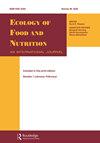野生动物对坦桑尼亚北部农牧业粮食生产的影响。
IF 1.3
4区 医学
Q4 NUTRITION & DIETETICS
Ecology of Food and Nutrition
Pub Date : 2024-05-01
Epub Date: 2024-03-18
DOI:10.1080/03670244.2024.2329978
引用次数: 0
摘要
人类与野生动物之间的相互作用会影响人类的福祉和野生动物种群的持久性。本文探讨了野生动物对坦桑尼亚北部塔兰吉雷生态系统农牧业粮食生产的影响。本文基于与农牧业马赛社区合作开展的为期 16 个月的人种学实地调查(2019-2020 年;2022 年;2023 年)、240 次半结构式访谈和一项家庭调查(n = 1076)。人们认为,毛虫、大象和斑马对作物生产的影响最大,而鬣狗则是食肉动物掠夺牲畜的罪魁祸首。野生动物的这些社会成本值得保护政策制定者进一步关注。本文章由计算机程序翻译,如有差异,请以英文原文为准。
Perceived Impacts of Wildlife on Agropastoral Food Production in Northern Tanzania.
Human-wildlife interactions can affect human wellbeing and wildlife population persistence. This paper addresses the perceived impacts of wildlife on agropastoral food production in the Tarangire ecosystem of northern Tanzania. It is based on sixteen months of collaborative ethnographic fieldwork with agropastoral Maasai communities (2019-2020; 2022; 2023), 240 semi-structured interviews, and a household survey (n = 1076). People felt that caterpillars, elephants, and zebras had the most significant effects on crop production, while hyenas were responsible for the bulk of livestock depredation by carnivores. These social costs of wildlife merit further attention from conservation policy makers.
求助全文
通过发布文献求助,成功后即可免费获取论文全文。
去求助
来源期刊
CiteScore
3.50
自引率
0.00%
发文量
23
审稿时长
>12 weeks
期刊介绍:
Ecology of Food and Nutrition is an international journal of food and nutrition in the broadest sense. The journal publishes peer-reviewed articles on all aspects of food and nutrition -- ecological, biological, and cultural. Ecology of Food and Nutrition strives to become a forum for disseminating scholarly information on the holistic and cross-cultural dimensions of the study of food and nutrition. It emphasizes foods and food systems not only in terms of their utilization to satisfy human nutritional needs and health, but also to promote and contest social and cultural identity. The content scope is thus wide -- articles may focus on the relationship between food and nutrition, food taboos and preferences, ecology and political economy of food, the evolution of human nutrition, changes in food habits, food technology and marketing, food and identity, and food sustainability. Additionally, articles focusing on the application of theories and methods to address contemporary food and nutrition problems are encouraged. Questions of the relationship between food/nutrition and culture are as germane to the journal as analyses of the interactions among nutrition and environment, infection and human health.

 求助内容:
求助内容: 应助结果提醒方式:
应助结果提醒方式:


